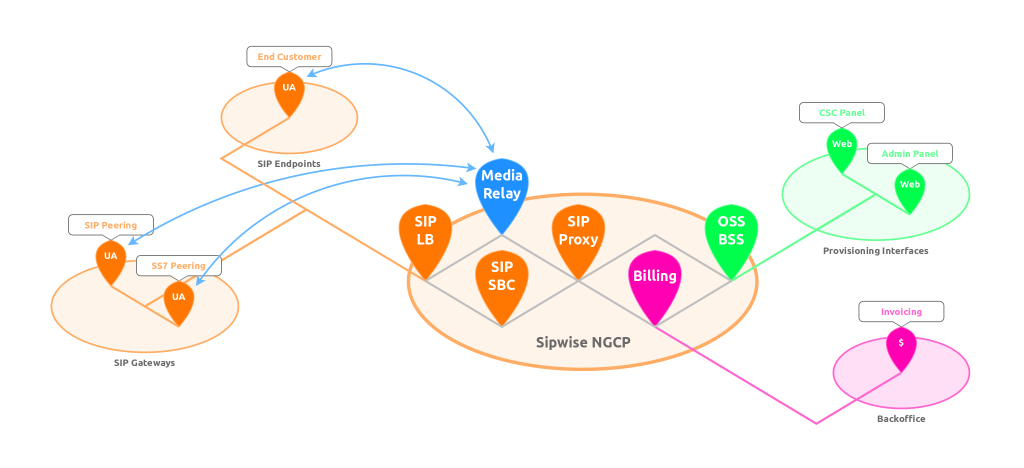sip:provider CE v2.5 Released
Only 4 months after the last release of version 2.4, I am excited to announce sip:providerCE v2.5!
What’s the sip:provider platform?
The Sipwise sip:provider platform is a highly versatile open source based VoIP soft-switch for ISPs and ITSPs to serve large numbers of SIP subscribers. It leverages existing building blocks like Kamailio, Sems and Asterisk to create a feature-rich and highly performant system by glueing them together in a best-practice approach and implementing missing pieces on top of it. Sipwise engineers have been working with Asterisk and Kamailio (and its predecessors SER and OpenSER) since 2004, and have roles on the management board of Kamailio and are contributing to these projects both in terms of patches and also financially by sponsoring development tasks. The sip:provider platform is available as a Community Edition (SPCE), which is fully free and open source, and as a commercial PRO appliance shipped turn-key in a high availability setup.
The SPCE can provide secure and feature-rich voice and video communication to end customers and connect them to other SIP-, Mobile- or traditional PSTN-networks. It can also act as a Session Border Controller in front of existing VoIP services in order to enable signaling encryption, IPv6 support, fraud- and Denial-of-Service prevention. Another use-case is to act as a SIP concentrator to bundle multiple SIP peerings for other VoIP services.
What’s new in v2.5?
There are a whole lot of new features, improvements and fixes since v2.4, here is an overview of the most important ones:
- Subscriber Features:
- Video Calls: The SPCE now supports video calls, optionally encrypted end-to-end with ZRTP by using a proper SIP client like Jitsi.
- Time Based Call Forwards: You can define complex time period definitions to trigger call forwards, e.g. for call deflections outside of office hours.
- Serial Call Hunting: This feature allows you to create serial hunt groups, e.g. to ring your land-line for 10sec, then ring your mobile phone for 30sec, and finally route the call to your voicebox if those targets haven’t picked up the call.
- Permanent Location Entries: If your device (e.g. a Cisco CallManager Express) can’t register on the platform, you can manually define a permanent registration entry via the Admin Panel.
- Billing Features:
- Fraud Detection: Post-Paid Subscribers can automatically get locked for outbound calls if they exceed a certain billing fee threshold during a month. You will receive regular emails with a list of affected subscribers.
- Call Initiation Time in CDRs: The initiation timestamp of calls is now stored along with the connect timestamp, so you can fetch the call establishment duration from CDRs.
- Network Features:
- IPv6 Support: The SPCE now supports IPv6 both for subscribers and for peerings. It also supports transparent bridging between IPv4 and IPv6 networks and vice versa, both for signaling and for media sessions.
- Internal Enhancements:
- Stateless Load-Balancer: The load-balancer has been reworked to operate completely stateless. This change squeezes out even more performance of the system while at the same time reducing the memory foot-print.
- Strict Rewrite-Rule Checks: When adding rewrite rules to the system, these rules are strictly checked for syntactic and semantic errors before being saved to the DB in order to prevent the proxy from refusing to come up on restarts due to regex errors.
- Rolling Release Support for DB Schema: All DB Schema changes are now versioned in a separate table, which allows for rolling releases from any past version to the latest one. This is also the first step towards a bleeding-edge trunk version where you can test the latest features without having to wait for stable releases.
- Optimized I/O Scheduler: Due to the heavy I/O operations for DB access and logging under high load, the I/O scheduler of the kernel has been changed to deadline to increase the throughput.
How do I test-drive the new version?
As usual, we’re providing both a VMWare Image and a Virtualbox Image for quick evaluation testing. Check the relevant section in the Handbook for detailed instructions.
How do I install the new version or upgrade from an older one?
For new users, please follow the Installation Instructions in the Handbook to set up the SPCE v2.5 from scratch.
For users of the SPCE v2.4, please follow the upgrade procedure outlined in the Handbook. If you happen to still run v2.2, please upgrade to v2.4 first by following the procedure in the v2.4 Handbook. If you have customized your configurations using customtt.tt2 files, you must migrate your changes to the new configuration files (especially the proxy- and lb-configuration) after the upgrade, otherwise all your calls will most certainly fail.
Acknowledgements
I really would like to thank our PRO customers and the SPCE community for their feedback, bug reports and feature suggestions to make this release happen. I hope you enjoy using the v2.5 release and keep your input coming. A big thank you also to all the developers of Kamailio and SEMS, who make it possible for us to provide an innovative and future-proof SIP engine as the core of our platform!

